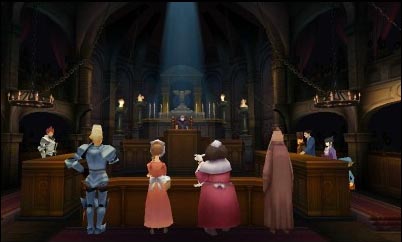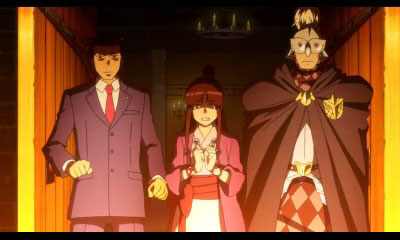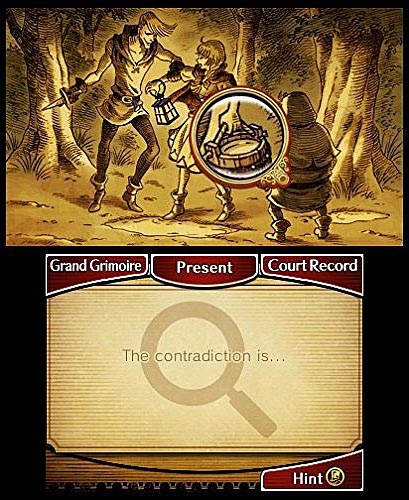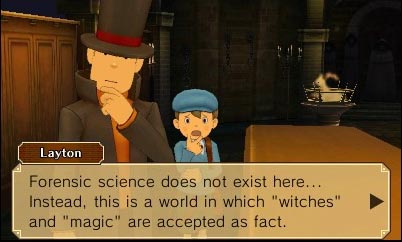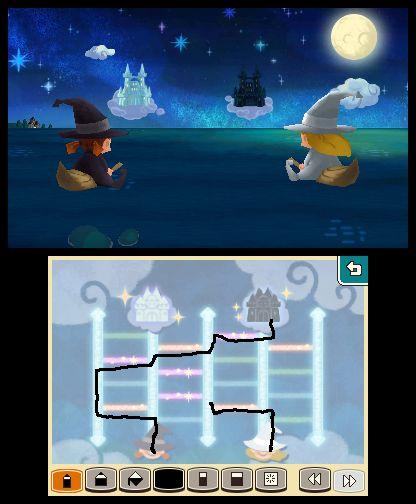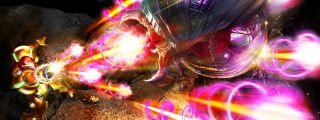I do not like visual novels in general. Most of the time they fail to engage me, and I lose interest. The Ace Attorney and Professor Layton series are traditionally exceptions to this rule. Both series’ generally have enough actual gameplay, engaging story lines, and interesting characters to get me to play them to completion. When Professor Layton Vs Phoenix Wright was announced I was excited, if a little skeptical. While both series’ definitely have thematic similarities that make them compatible, they are different enough that it made me wonder how exactly they were going to work when smashed together. The game is out now and I can safely say that Level 5 did manage to blend the styles nicely. Even so, there are some sticking points that make this crossover feel like a good game that’s somehow less than the sum of its parts.
For newcomers, the Ace Attorney series follows the adventures of Phoenix Wright, a defense attorney (at least initially, the series branches out to other characters after the third entry). The game consists mostly of investigating a case and then representing the accused in a trial. The investigations and trials are really complex puzzles that are blended into the story. Professor Layton’s gameplay, on the other hand, consists of more literal puzzles. Layton is an archaeologist and puzzle enthusiast who investigates mysteries along with his assistant Luke. Layton and Luke both live in an alternate universe where everything is solved by puzzles. Locked safe? The key is a puzzle. Need to persuade someone? It’s a puzzle. Need to start the ignition on a car to get away? You know what I’m getting at. It sounds silly but it works as a puzzle delivery platform within the story. It helps that there is a wide variety int he puzzles that are presented in Layton.
Professor Layton Vs. Phoenix Wright finds an elegant balance between these two styles by severely reducing the time and complexity of the investigation phases, instead replacing it with more story driven sections that are closer to the Layon series of games. Most investigations and interrogations consist of puzzles, rather than gathering clues. The flow of the game is then puzzle solving broken up by court room sections. It works rather well, and the pacing is spot on, although the final case drags a bit. To make sure that all the characters are represented the game comes up with various reasons to have different pairings of characters in both the puzzle solving sections and the trials. This also makes the game feel like a real crossover. Since the characters don’t stick to their respective style of game, the interactions feel integrated into the whole game rather than just the parts they are expected to participate in, and it also makes the plot feel like a unified narrative rather than just a story divided in sections for the sake of gameplay.
The game’s plot revolves around a young girl called Espella Cantebella. During the opening cinematic, we see her running from something in London while clutching a mysterious book, and eventually finding her way to Professor Layton on the recommendation of her companion, a former apprentice of the professor. The situation gets a little out of hand and it culminates in Layton and Luke being sucked into Espella’s book. The game then cuts to Phoenix Wright, visiting London as part of some international attorney league as America’s representative (yes, we are still pretending he is American. Eat your hamburger Apollo). In true Ace Attorney fashion, he and his assistant Maya Fey get pulled into a trial without knowing anything about it. Of course the client is Espella, and upon successfully defending her, they too are sucked into her book. These sections are more tutorials on how the game styles work than anything else, and they follow the play style of their respective games.
When both pairs return to consciousness they find themselves in the magical land of Laberynthia, a medieval fantasy world where magic and witches are real. In this setting, being a witch is a crime punishable by death. The game’s primary case revovles around defending Espella who has been accused of being the incarnation of a Great Witch named Bezella. The move to a fantasy setting was an interesting choice, but perhaps not the best for either series. While both series have been somewhat liberal in what they could consider plausible in the past, now that magic is included it seems that the writers thought they could use it to do whatever they want with the story.
Layton is particularly guilty of this during this story. In fact both protagonists seem to have had their personality altered to fit this narrative. Phoenix Wright has always been treated as a scrub in his own games, despite pretty much being a miracle worker who has never lost a case. The character has never really come across as dumb, which in this game he seems to do. He frequently misses obvious clues and fails to make some pretty simple connections. Layton on the other hand has turned into the Most Intresting Man in the World. He apparently discovers the great secret of Laberynthia very early on, and just doesn’t tell anyone. Instead, he just says things like “I am sure you have figured it out… haven’t you”. There are two possible explanations for this, either he is like that kid in the playground who claims he knows what a swear word means, but wants you to tell him to make sure YOU know, or he is an enormous jerk. He also has some action scenes (played out as puzzles of course) which feel particularly out of place because Layton still has the same design out of the games, and so he looks smaller than all the other characters.
The gameplay itself is fine, adequate, and not much else. The puzzles and the trials aren’t as good as they are in the core games, but if you are a newcomer to the series you will probably not notice and think they’re just fine. Ironically, this might mean that the core of a game filled with fan service is probably more appealing to newcomers. The puzzles are simpler than in a core Layton game, and to my surprise some of the mandatory story puzzles repeated themselves. I can’t say this has never happened before in a Layton game, but I don’t remember puzzles repeating within the core story. Puzzles feel easier too. I finished the game with more than enough hint coins left over. The trials are also simplistic. They are all solved in one sitting, which means that they are not as complex as the ones in most Ace Attorney games. They are also pretty self explanatory. There is a new mechanic included in the game where you interrogate several witnesses at once. It seems like something that could throw a curve into the system, but it is really easy to get used to it. You essentially treat them as one witness. The setting sucks a lot of the fun out of the trials too, since the “gotcha” rush of getting the culprit is one of the most engaging part of the Ace Attorney series. When the crime is just “being a witch” and you know you are sending that person to a firey death, it kind of kills the fun.
What carries the game is the characters. The banter and relationship between the two leads and their sidekicks is fantastic, and a lot of the supporting cast is excellent too. The two prosecutors are quirky, nuanced, and intimidating in pure Ace Attorney fashion. The supporting cast is also the quality you’d expect from both series. The weakest link is probably Espella herself, who is saccharine sweet and serves no other purpose other than just serve as a point of conflict. There is nothing particularly wrong with her, but that’s just because there isn’t much to her beyond being a plot point.
Professor Layton Vs Phoenix Wright was at least good enough to keep me interested until I finished it. The story is silly, but for the most part it is told in an engaging game. The drama of the court cases is still there as is the sense of mystery and discovery that makes the Layton games great. Everything just pales a bit in comparison to the normal entries in both series’. Still, if you are a fan of either series I do recommend picking it up, just be sure you aren’t missing better games in both franchises.


